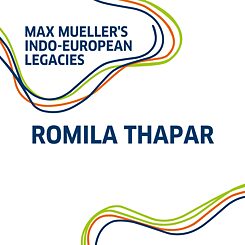In conversation with ROMILA THAPAR
Dr. Romila Thapar - Professor Emerita, Jawaharlal Nehru University
Romila Thapar's research into early Indian history has been part of the shift from treating ancient history as Indology to establishing it as a Social Science. The two themes on which she has worked are the social and cultural history of early India, which involved asking new questions of textual data and integrating some archaeological sources, as well as attempting to understand the co-relation of society, economy, and religion, the second theme has been historiography, both the modern perspective of writing the history of early India, as well as how history was recorded in the early past.
IN CONVERSATION WITH ARIE L. MOLENDIJK
Prof. Dr. Arie L. Molendijk - Professor of the History of Christianity and Philosophy, University of Groningen
Arie Molendijk is an expert on the field of history of nineteenth- and twentieth-century German and Dutch Theology and Religious Studies; Ernst Troeltsch (1865-1923); History of Liberal Protestantism; Religion and society; Material Christianity; Religion in the Public Domain.
IN CONVERSATION WITH AXEL MICHAELS
Prof. Dr. Axel Michaels - Senior Professor - Chairman of the Board of Trustees of the Josefine and Eduard von Portheim Foundation for Science and Art, Centre for Asian and Transcultural Studies (CATS) / South Asia Institute of Heidelberg University
Axel Michaels, the Professor of Classical Indology at the South Asia Institute at the University of Heidelberg, has published widely in the fields of Indology, anthropology, and religious studies. He has also conducted extensive fieldwork in Nepal and Northern India.
In conversation with Angus Nicholls
Dr. Angus Nicholls: Professor, Comparative Literature and German and Director of Research for Comparative Literature and Modern Languages, Queen Mary University of London
He is interested in the intersections between literary studies, philosophy and other humanities disciplines such as critical theory, anthropology and psychoanalysis, and his work is mainly concerned with the German and Anglophone traditions from the late eighteenth century through to the twentieth century.
In conversation with Patricia Casey Sutcliffe
Dr Patricia Casey Sutcliffe - Editor, German Historical Institute Washington
She joined the German Historical Institute as an editor in 2006 after a 14-year career teaching English at German universities and German at American ones. In December 2000, she received her PhD in Germanic Studies from the University of Texas at Austin with a dissertation based on intellectual history: Friedrich Max Mueller and William Dwight Whitney as Exporters of Nineteenth-Century German Philology: A Sociological Analysis of the Development of their Linguistic Theories.
In commemoration of Friedrich Max Mueller's bicentennial, the Goethe-Institut / Max Mueller Bhavan New Delhi initiated an open call for artists to reimagine our beloved space in New Delhi a hundred years from now. The winning entry 'Metamorphosis: A Sustainable Legacy' by Soumendra Majumder was selected by the jury based on criteria such as originality, visual appeal, concept and execution, and alignment with Institut's identity.
© Soumendra MajumderIn his artistic statement, Majumder wrote, “Metamorphosis challenges the conventional boundaries of heritage conservation by demonstrating that sustainability and historical preservation can coalesce seamlessly. The high-rise structure not only revitalizes the physical space of the Goethe-Institut Max Mueller Bhavan in New Delhi but serves as a metaphor for the continuous evolution of cultural institutions in the face of contemporary challenges.”











